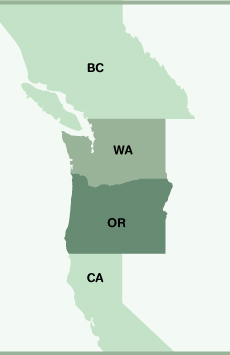Oregon's Beverage Container Act (SB 707)
SB 707, signed into law on June 7, 2007, amends the existing law by adding water and flavored water to the list of beverage containers included in the bill. The bill also created a nine-member Task Force to address issues including redemption centers, coverage of other beverage containers, increasing the deposit and implementing handling fees. Currently, distributors keep 100% of the unredeemed deposits and do not pay a handling fee to retailers. In October 2008, the task force released the Bottle Bill Task Force Final Report (PDF file, 4MB).
The task force made the following five recommendations:
- Recommendation 1: Support the industry proposal to run a statewide system of redemption centers. If the industry proposal is not implemented, a path to a state-run redemption center system should be included.
- Recommendation 2: Expand the list of beverages included in the definition of beverage in the original Bottle Bill language.
- Recommendation 3: Increase the refund value to be paid when redeeming beverage containers.
- Recommendation 4: Limit the redemption of beverage containers that are purchased out of state.
- Recommendation 5: Industry run redemption center system collecting and utilizing the refund value of unredeemed beverage containers to run the redemption centers. Unredeemed deposits should be collected by the state ONLY if the industry run redemption center system is not successful and a state-run system is implemented.
Oregon's Beverage Container Act, ORS Ch. 459a.700 was enacted on July 2, 1971. The Beverage Container Act is an early example of product stewardship legislation which requires beverage producers, distributors, retailers and consumers to share the responsibility for recycling beverage containers. The Act was the first bottle bill in the United States which established a refund value (at least 5 cents per disposable container or 2 center per refillable container) for beer, malt, carbonated soft drinks, mineral water and soda water beverage containers.
According to the law, containers can either be collected by retailers that sell beverages in containers to consumers or they can be collected by a redemption center that collects the containers on behalf of the retailers. Redemptions centers can be run by any entity. The entity must submit an application to and be approved by the Oregon Liquor Control Commission (OLCC). The centers must indicate to the OLCC the kind of containers they will accept and the names and addresses of the retailers that will be served by the redemption center. Distributors are responsible for paying the dealer or redemption center the refund value of the returned beverage containers. The program is financed and run without government funding, staff or resources except for oversight and enforcement of the law by the OLCC.
The program is administered by the Oregon Liquor Control Commission (OLCC). For additional information, see the Oregon Department of Environmental Quality Fact Sheet: The Expanded Bottle Bill (PDF file, 175KB) and Frequently Asked Questions for Consumers and Distributors, Bottlers, and Beverage Manufacturers.
